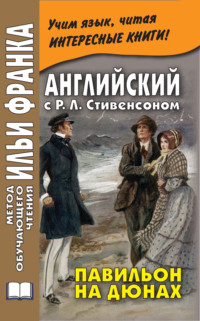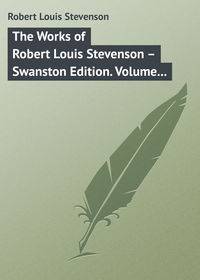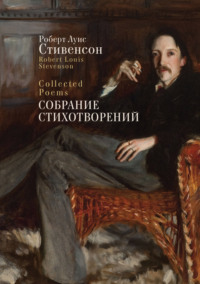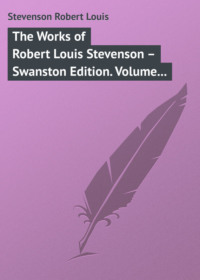 полная версия
полная версияNew Arabian Nights
The Master of the Horse regained his feet at once.
“Your Highness,” he said, “may I be excused in my attendance this afternoon? I dare not, as an honourable man, venture a second time into that fatal house until I have perfectly ordered my affairs. Your Highness shall meet, I promise him, with no more opposition from the most devoted and grateful of his servants.”
“My dear Geraldine,” returned Prince Florizel, “I always regret when you oblige me to remember my rank. Dispose of your day as you think fit, but be here before eleven in the same disguise.”
The club, on this second evening, was not so fully attended; and when Geraldine and the Prince arrived, there were not above half-a-dozen persons in the smoking-room. His Highness took the President aside and congratulated him warmly on the demise of Mr. Malthus.
“I like,” he said, “to meet with capacity, and certainly find much of it in you. Your profession is of a very delicate nature, but I see you are well qualified to conduct it with success and secrecy.”
The President was somewhat affected by these compliments from one of his Highness’s superior bearing. He acknowledged them almost with humility.
“Poor Malthy!” he added, “I shall hardly know the club without him. The most of my patrons are boys, sir, and poetical boys, who are not much company for me. Not but what Malthy had some poetry, too; but it was of a kind that I could understand.”
“I can readily imagine you should find yourself in sympathy with Mr. Malthus,” returned the Prince. “He struck me as a man of a very original disposition.”
The young man of the cream tarts was in the room, but painfully depressed and silent. His late companions sought in vain to lead him into conversation.
“How bitterly I wish,” he cried, “that I had never brought you to this infamous abode! Begone, while you are clean-handed. If you could have heard the old man scream as he fell, and the noise of his bones upon the pavement! Wish me, if you have any kindness to so fallen a being – wish the ace of spades for me to-night!”
A few more members dropped in as the evening went on, but the club did not muster more than the devil’s dozen when they took their places at the table. The Prince was again conscious of a certain joy in his alarms; but he was astonished to see Geraldine so much more self-possessed than on the night before.
“It is extraordinary,” thought the Prince, “that a will, made or unmade, should so greatly influence a young man’s spirit.”
“Attention, gentlemen!” said the President, and he began to deal.
Three times the cards went all round the table, and neither of the marked cards had yet fallen from his hand. The excitement as he began the fourth distribution was overwhelming. There were just cards enough to go once more entirely round. The Prince, who sat second from the dealer’s left, would receive, in the reverse mode of dealing practised at the club, the second last card. The third player turned up a black ace – it was the ace of clubs. The next received a diamond, the next a heart, and so on; but the ace of spades was still undelivered. At last, Geraldine, who sat upon the Prince’s left, turned his card; it was an ace, but the ace of hearts.
When Prince Florizel saw his fate upon the table in front of him, his heart stood still. He was a brave man, but the sweat poured off his face. There were exactly fifty chances out of a hundred that he was doomed. He reversed the card; it was the ace of spades. A loud roaring filled his brain, and the table swam before his eyes. He heard the player on his right break into a fit of laughter that sounded between mirth and disappointment; he saw the company rapidly dispersing, but his mind was full of other thoughts. He recognised how foolish, how criminal, had been his conduct. In perfect health, in the prime of his years, the heir to a throne, he had gambled away his future and that of a brave and loyal country. “God,” he cried, “God forgive me!” And with that, the confusion of his senses passed away, and he regained his self-possession in a moment.
To his surprise Geraldine had disappeared. There was no one in the card-room but his destined butcher consulting with the President, and the young man of the cream tarts, who slipped up to the Prince, and whispered in his ear: —
“I would give a million, if I had it, for your luck.”
His Highness could not help reflecting, as the young man departed, that he would have sold his opportunity for a much more moderate sum.
The whispered conference now came to an end. The holder of the ace of clubs left the room with a look of intelligence, and the President, approaching the unfortunate Prince, proffered him his hand.
“I am pleased to have met you, sir,” said he, “and pleased to have been in a position to do you this trifling service. At least, you cannot complain of delay. On the second evening – what a stroke of luck!”
The Prince endeavoured in vain to articulate something in response, but his mouth was dry and his tongue seemed paralysed.
“You feel a little sickish?” asked the President, with some show of solicitude. “Most gentlemen do. Will you take a little brandy?”
The Prince signified in the affirmative, and the other immediately filled some of the spirit into a tumbler.
“Poor old Malthy!” ejaculated the President, as the Prince drained the glass. “He drank near upon a pint, and little enough good it seemed to do him!”
“I am more amenable to treatment,” said the Prince, a good deal revived. “I am my own man again at once, as you perceive. And so, let me ask you, what are my directions?”
“You will proceed along the Strand in the direction of the City, and on the left-hand pavement, until you meet the gentleman who has just left the room. He will continue your instructions, and him you will have the kindness to obey; the authority of the club is vested in his person for the night. And now,” added the President, “I wish you a pleasant walk.”
Florizel acknowledged the salutation rather awkwardly, and took his leave. He passed through the smoking-room, where the bulk of the players were still consuming champagne, some of which he had himself ordered and paid for; and he was surprised to find himself cursing them in his heart. He put on his hat and greatcoat in the cabinet, and selected his umbrella from a corner. The familiarity of these acts, and the thought that he was about them for the last time, betrayed him into a fit of laughter which sounded unpleasantly in his own ears. He conceived a reluctance to leave the cabinet, and turned instead to the window. The sight of the lamps and the darkness recalled him to himself.
“Come, come, I must be a man,” he thought, “and tear myself away.”
At the corner of Box Court three men fell upon Prince Florizel and he was unceremoniously thrust into a carriage, which at once drove rapidly away. There was already an occupant.
“Will your Highness pardon my zeal?” said a well known voice.
The Prince threw himself upon the Colonel’s neck in a passion of relief.
“How can I ever thank you?” he cried. “And how was this effected?”
Although he had been willing to march upon his doom, he was overjoyed to yield to friendly violence, and return once more to life and hope.
“You can thank me effectually enough,” replied the Colonel, “by avoiding all such dangers in the future. And as for your second question, all has been managed by the simplest means. I arranged this afternoon with a celebrated detective. Secrecy has been promised and paid for. Your own servants have been principally engaged in the affair. The house in Box Court has been surrounded since nightfall, and this, which is one of your own carriages, has been awaiting you for nearly an hour.”
“And the miserable creature who was to have slain me – what of him?” inquired the Prince.
“He was pinioned as he left the club,” replied the Colonel, “and now awaits your sentence at the Palace, where he will soon be joined by his accomplices.”
“Geraldine,” said the Prince, “you have saved me against my explicit orders, and you have done well. I owe you not only my life, but a lesson; and I should be unworthy of my rank if I did not show myself grateful to my teacher. Let it be yours to choose the manner.”
There was a pause, during which the carriage continued to speed through the streets, and the two men were each buried in his own reflections. The silence was broken by Colonel Geraldine.
“Your Highness,” said he, “has by this time a considerable body of prisoners. There is at least one criminal among the number to whom justice should be dealt. Our oath forbids us all recourse to law; and discretion would forbid it equally if the oath were loosened. May I inquire your Highness’s intention?”
“It is decided,” answered Florizel; “the President must fall in duel. It only remains to choose his adversary.”
“Your Highness has permitted me to name my own recompense,” said the Colonel. “Will he permit me to ask the appointment of my brother? It is an honourable post, but I dare assure your Highness that the lad will acquit himself with credit.”
“You ask me an ungracious favour,” said the Prince, “but I must refuse you nothing.”
The Colonel kissed his hand with the greatest affection; and at that moment the carriage rolled under the archway of the Prince’s splendid residence.
An hour after, Florizel in his official robes, and covered with all the orders of Bohemia, received the members of the Suicide Club.
“Foolish and wicked men,” said he, “as many of you as have been driven into this strait by the lack of fortune shall receive employment and remuneration from my officers. Those who suffer under a sense of guilt must have recourse to a higher and more generous Potentate than I. I feel pity for all of you, deeper than you can imagine; to-morrow you shall tell me your stories; and as you answer more frankly, I shall be the more able to remedy your misfortunes. As for you,” he added, turning to the President, “I should only offend a person of your parts by any offer of assistance; but I have instead a piece of diversion to propose to you. Here,” laying his hand on the shoulder of Colonel Geraldine’s young brother, “is an officer of mine who desires to make a little tour upon the Continent; and I ask you, as a favour, to accompany him on this excursion. Do you,” he went on, changing his tone, “do you shoot well with the pistol? Because you may have need of that accomplishment. When two men go travelling together, it is best to be prepared for all. Let me add that, if by any chance you should lose young Mr. Geraldine upon the way, I shall always have another member of my household to place at your disposal; and I am known, Mr. President, to have long eyesight, and as long an arm.”
With these words, said with much sternness, the Prince concluded his address. Next morning the members of the club were suitably provided for by his munificence, and the President set forth upon his travels, under the supervision of Mr. Geraldine, and a pair of faithful and adroit lackeys, well trained in the Prince’s household. Not content with this, discreet agents were put in possession of the house in Box Court, and all letters or visitors for the Suicide Club or its officials were to be examined by Prince Florizel in person.
Here (says my Arabian author) ends The Story of the Young Man with the Cream Tarts, who is now a comfortable householder in Wigmore Street, Cavendish Square. The number, for obvious reasons, I suppress. Those who care to pursue the adventures of Prince Florizel and the President of the Suicide Club, may read the History of the Physician and the Saratoga Trunk.
STORY OF THE PHYSICIAN AND THE SARATOGA TRUNK
Mr. Silas Q. Scuddamore was a young American of a simple and harmless disposition, which was the more to his credit as he came from New England – a quarter of the New World not precisely famous for those qualities. Although he was exceedingly rich, he kept a note of all his expenses in a little paper pocket-book; and he had chosen to study the attractions of Paris from the seventh story of what is called a furnished hotel, in the Latin Quarter. There was a great deal of habit in his penuriousness; and his virtue, which was very remarkable among his associates, was principally founded upon diffidence and youth.
The next room to his was inhabited by a lady, very attractive in her air and very elegant in toilette, whom, on his first arrival, he had taken for a Countess. In course of time he had learned that she was known by the name of Madame Zéphyrine, and that whatever station she occupied in life it was not that of a person of title. Madame Zéphyrine, probably in the hope of enchanting the young American, used to flaunt by him on the stairs with a civil inclination, a word of course, and a knock-down look out of her black eyes, and disappear in a rustle of silk, and with the revelation of an admirable foot and ankle. But these advances, so far from encouraging Mr. Scuddamore, plunged him into the depths of depression and bashfulness. She had come to him several times for a light, or to apologise for the imaginary depredations of her poodle; but his mouth was closed in the presence of so superior a being, his French promptly left him, and he could only stare and stammer until she was gone. The slenderness of their intercourse did not prevent him from throwing out insinuations of a very glorious order when he was safely alone with a few males.
The room on the other side of the American’s – for there were three rooms on a floor in the hotel – was tenanted by an old English physician of rather doubtful reputation. Dr. Noel, for that was his name, had been forced to leave London, where he enjoyed a large and increasing practice; and it was hinted that the police had been the instigators of this change of scene. At least he, who had made something of a figure in earlier life, now dwelt in the Latin Quarter in great simplicity and solitude, and devoted much of his time to study. Mr. Scuddamore had made his acquaintance, and the pair would now and then dine together frugally in a restaurant across the street.
Silas Q. Scuddamore had many little vices of the more respectable order, and was not restrained by delicacy from indulging them in many rather doubtful ways. Chief among his foibles stood curiosity. He was a born gossip; and life, and especially those parts of it in which he had no experience, interested him to the degree of passion. He was a pert, invincible questioner, pushing his inquiries with equal pertinacity and indiscretion; he had been observed, when he took a letter to the post, to weigh it in his hand, to turn it over and over, and to study the address with care; and when he found a flaw in the partition between his room and Madame Zéphyrine’s, instead of filling it up, he enlarged and improved the opening, and made use of it as a spy-hole on his neighbour’s affairs.
One day, in the end of March, his curiosity growing as it was indulged, he enlarged the hole a little further, so that he might command another corner of the room. That evening, when he went as usual to inspect Madame Zéphyrine’s movements, he was astonished to find the aperture obscured in an odd manner on the other side, and still more abashed when the obstacle was suddenly withdrawn and a titter of laughter reached his ears. Some of the plaster had evidently betrayed the secret of his spy-hole, and his neighbour had been returning the compliment in kind. Mr. Scuddamore was moved to a very acute feeling of annoyance; he condemned Madame Zéphyrine unmercifully; he even blamed himself; but when he found, next day, that she had taken no means to baulk him of his favourite pastime, he continued to profit by her carelessness, and gratify his idle curiosity.
That next day Madame Zéphyrine received a long visit from a tall, loosely-built man of fifty or upwards, whom Silas had not hitherto seen. His tweed suit and coloured shirt, no less than his shaggy side-whiskers, identified him as a Britisher, and his dull grey eye affected Silas with a sense of cold. He kept screwing his mouth from side to side and round and round during the whole colloquy, which was carried on in whispers. More than once it seemed to the young New Englander as if their gestures indicated his own apartment; but the only thing definite he could gather by the most scrupulous attention was this remark made by the Englishman in a somewhat higher key, as if in answer to some reluctance or opposition.
“I have studied his taste to a nicety, and I tell you again and again you are the only woman of the sort that I can lay my hands on.”
In answer to this, Madame Zéphyrine sighed, and appeared by a gesture to resign herself, like one yielding to unqualified authority.
That afternoon the observatory was finally blinded, a wardrobe having been drawn in front of it upon the other side; and while Silas was still lamenting over this misfortune, which he attributed to the Britisher’s malign suggestion, the concierge brought him up a letter in a female handwriting. It was conceived in French of no very rigorous orthography, bore no signature, and in the most encouraging terms invited the young American to be present in a certain part of the Bullier Ball at eleven o’clock that night. Curiosity and timidity fought a long battle in his heart; sometimes he was all virtue, sometimes all fire and daring; and the result of it was that, long before ten, Mr. Silas Q. Scuddamore presented himself in unimpeachable attire at the door of the Bullier Ball Rooms, and paid his entry money with a sense of reckless devilry that was not without its charm.
It was Carnival time, and the Ball was very full and noisy. The lights and the crowd at first rather abashed our young adventurer, and then, mounting to his brain with a sort of intoxication, put him in possession of more than his own share of manhood. He felt ready to face the devil, and strutted in the ballroom with the swagger of a cavalier. While he was thus parading, he became aware of Madame Zéphyrine and her Britisher in conference behind a pillar. The cat-like spirit of eaves-dropping overcame him at once. He stole nearer and nearer on the couple from behind, until he was within earshot.
“That is the man,” the Britisher was saying; “there – with the long blond hair – speaking to a girl in green.”
Silas identified a very handsome young fellow of small stature, who was plainly the object of this designation.
“It is well,” said Madame Zéphyrine. “I shall do my utmost. But, remember, the best of us may fail in such a matter.”
“Tut!” returned her companion; “I answer for the result. Have I not chosen you from thirty? Go; but be wary of the Prince. I cannot think what cursed accident has brought him here to-night. As if there were not a dozen balls in Paris better worth his notice than this riot of students and counter-jumpers! See him where he sits, more like a reigning Emperor at home than a Prince upon his holidays!”
Silas was again lucky. He observed a person of rather a full build, strikingly handsome, and of a very stately and courteous demeanour, seated at table with another handsome young man, several years his junior, who addressed him with conspicuous deference. The name of Prince struck gratefully on Silas’s Republican hearing, and the aspect of the person to whom that name was applied exercised its usual charm upon his mind. He left Madame Zéphyrine and her Englishman to take care of each other, and threading his way through the assembly, approached the table which the Prince and his confidant had honoured with their choice.
“I tell you, Geraldine,” the former was saying, “the action is madness. Yourself (I am glad to remember it) chose your brother for this perilous service, and you are bound in duty to have a guard upon his conduct. He has consented to delay so many days in Paris; that was already an imprudence, considering the character of the man he has to deal with; but now, when he is within eight-and-forty hours of his departure, when he is within two or three days of the decisive trial, I ask you, is this a place for him to spend his time? He should be in a gallery at practice; he should be sleeping long hours and taking moderate exercise on foot; he should be on a rigorous diet, without white wines or brandy. Does the dog imagine we are all playing comedy? The thing is deadly earnest, Geraldine.”
“I know the lad too well to interfere,” replied Colonel Geraldine, “and well enough not to be alarmed. He is more cautious than you fancy, and of an indomitable spirit. If it had been a woman I should not say so much, but I trust the President to him and the two valets without an instant’s apprehension.”
“I am gratified to hear you say so,” replied the Prince; “but my mind is not at rest. These servants are well-trained spies, and already has not this miscreant succeeded three times in eluding their observation and spending several hours on end in private, and most likely dangerous, affairs? An amateur might have lost him by accident, but if Rudolph and Jérome were thrown off the scent, it must have been done on purpose, and by a man who had a cogent reason and exceptional resources.”
“I believe the question is now one between my brother and myself,” replied Geraldine, with a shade of offence in his tone.
“I permit it to be so, Colonel Geraldine,” returned Prince Florizel. “Perhaps, for that very reason, you should be all the more ready to accept my counsels. But enough. That girl in yellow dances well.”
And the talk veered into the ordinary topics of a Paris ballroom in the Carnival.
Silas remembered where he was, and that the hour was already near at hand when he ought to be upon the scene of his assignation. The more he reflected the less he liked the prospect, and as at that moment an eddy in the crowd began to draw him in the direction of the door, he suffered it to carry him away without resistance. The eddy stranded him in a corner under the gallery, where his ear was immediately struck with the voice of Madame Zéphyrine. She was speaking in French with the young man of the blond locks who had been pointed out by the strange Britisher not half-an-hour before.
“I have a character at stake,” she said, “or I would put no other condition than my heart recommends. But you have only to say so much to the porter, and he will let you go by without a word.”
“But why this talk of debt?” objected her companion.
“Heavens!” said she, “do you think I do not understand my own hotel?”
And she went by, clinging affectionately to her companion’s arm.
This put Silas in mind of his billet.
“Ten minutes hence,” thought he, “and I may be walking with as beautiful a woman as that, and even better dressed – perhaps a real lady, possibly a woman or title.”
And then he remembered the spelling, and was a little downcast.
“But it may have been written by her maid,” he imagined.
The clock was only a few minutes from the hour, and this immediate proximity set his heart beating at a curious and rather disagreeable speed. He reflected with relief that he was in no way bound to put in an appearance. Virtue and cowardice were together, and he made once more for the door, but this time of his own accord, and battling against the stream of people which was now moving in a contrary direction. Perhaps this prolonged resistance wearied him, or perhaps he was in that frame of mind when merely to continue in the same determination for a certain number of minutes produces a reaction and a different purpose. Certainly, at least, he wheeled about for a third time, and did not stop until he had found a place of concealment within a few yards of the appointed place.
Here he went through an agony of spirit, in which he several times prayed to God for help, for Silas had been devoutly educated. He had now not the least inclination for the meeting; nothing kept him from flight but a silly fear lest he should be thought unmanly; but this was so powerful that it kept head against all other motives; and although it could not decide him to advance, prevented him from definitely running away. At last the clock indicated ten minutes past the hour. Young Scuddamore’s spirit began to rise; he peered round the corner and saw no one at the place of meeting; doubtless his unknown correspondent had wearied and gone away. He became as bold as he had formerly been timid. It seemed to him that if he came at all to the appointment, however late, he was clear from the charge of cowardice. Nay, now he began to suspect a hoax, and actually complimented himself on his shrewdness in having suspected and outmanoeuvred his mystifiers. So very idle a thing is a boy’s mind!









